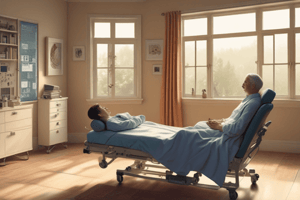Podcast
Questions and Answers
What should be included in the social history of a patient with mental problems?
What should be included in the social history of a patient with mental problems?
- Religious affiliation
- Favorite TV show
- Childhood experiences (correct)
- Favorite food
What should be included in the history of present illness of a patient with mental problems?
What should be included in the history of present illness of a patient with mental problems?
- The patient's favorite TV show
- The patient's favorite food
- The patient's favorite color
- The mode of onset (correct)
Why is it important to estimate the reliability of the source of information when taking the history of a patient with mental problems?
Why is it important to estimate the reliability of the source of information when taking the history of a patient with mental problems?
- To know if the source is a medical professional
- To know if the source has a good relationship with the patient (correct)
- To know if the patient is telling the truth
- To know if the source is a family member
Flashcards are hidden until you start studying
Study Notes
History Taking for Patients with Mental Problems
- The history taking process for patients with mental problems includes identifying the patient's name, age, sex, and referring physician.
- It is essential to estimate the reliability of the source of information, including the relationship of the source to the patient and how well they know the patient.
- The chief complaint should be the exact reason why the patient came, and it should always be a quotation of the patient's own complaint.
- The history of present illness should include the mode of onset, how the illness affected the patient's usual life functions, and specific symptoms that have appeared during the time of present illness.
- The past psychiatric and medical history should include emotional or mental disturbances, psychosomatic disorders, medical conditions, and neurological disorders that may have triggered the patient's present illness.
- Family history should note the presence or absence of psychiatric or neurological illness among first and second-degree relatives, including the age of onset, course of illness, specific symptoms, and treatment.
- Social history should include childhood experiences, school experiences, peer relationships, special interests, psychosexual history, drug/alcohol use, work experience, marital and relationship history, educational history, religion, and social activity.
- Childhood history should include the patient-mother relationship, feeding habits, significant milestones, unusual behaviors, and temperament as a child.
- Adolescence history should include peer relationships, school history, special interests, psychosexual history, drug/alcohol use, work experience, and any symptoms of fights, arguments, sleeping, or eating problems.
- Adulthood history should include occupational history, marital and relationship history, educational history, religion, and social activity.
- The history of psychiatric and medical treatment should include past hospitalizations, medication, and their effects on the patient.
- The history taking process for patients with mental problems should be comprehensive and accurate to facilitate proper diagnosis and treatment.
Studying That Suits You
Use AI to generate personalized quizzes and flashcards to suit your learning preferences.




